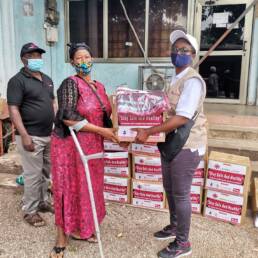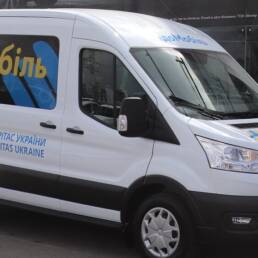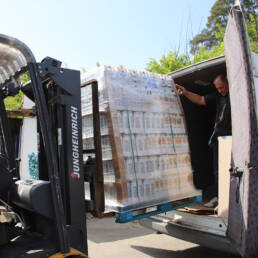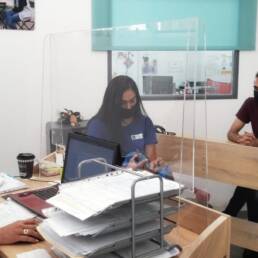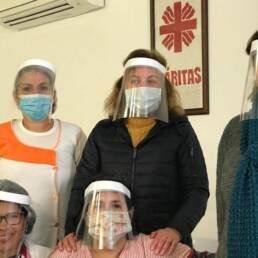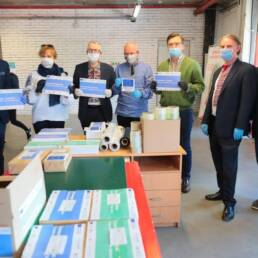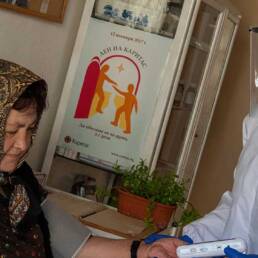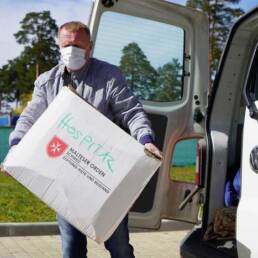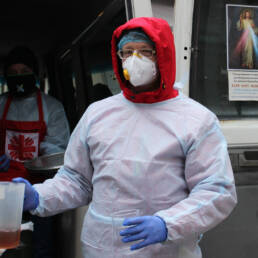Author
Dijana Muzička
Project Manager
Caritas Bosnia and Herzegovina
We keep working regardless of the virus. Migrants need our support more than ever!
On 17 March, Bosnia and Herzegovina declared a state of emergency due to the coronavirus. As in many other countries in Europe and the world over, the consequences of the outbreak are problematic and serious. For example, many people have lost their temporary jobs. The country is struggling to develop a strategy to support the hundreds of migrants who are living on the streets or in non-suitable accommodations outside dedicated camps, which are already crowded and operating at full capacity. Each of the ten cantons of the federation has its own agenda and responsibilities, which does not make things any easier.
The situation of migrants is indeed of great concern. In Tuzla, migrants and asylum seekers are not allowed to gather in one place, making it difficult for NGOs to assist them. There are still some local citizens who show their empathy and support as they can, for example by distributing blankets and sleeping bags. However, the vast majority of the local community is living in distress and showing a hostile attitude towards migrants. The Red Cross is the only organisation allowed to distribute food, but in a very restricted way.
Migrants and asylum seekers are human beings who need to eat, sleep and be protected in a dignified way. Their living standards are minimal, yet they fear to ask for help and feel that they need to hide from other people and from the police. Nobody should ever feel unwelcome and lost, even less so during a pandemic. Now there are restrictions also on renting houses, rooms or other type of shelters. Even persons wishing to help find it very difficult to do so.

In Tuzla, the local NGOs operate as one. For example, one of Caritas’ partner organisations opened a new safe house. Caritas does not close under these difficult circumstances either and continues to operate the laundry service to ensure a minimum standard of hygiene for those in need. The Caritas laundry service in the Bira camp is also still working every day. Now, it is needed more than ever!
Blažuj camp
In the Sarajevo canton, the treatment of migrants and asylum seekers is a little bit better. The police is patrolling the area and if they see any migrants, they drive them to Blažuj. This new camp has a capacity to house 1,500 people, but the conditions are incredibly challenging. The residents find it hard to endure the imposed isolation and some tend to leave after a few hours. Many migrants and asylum seekers are afraid of each other, especially since they need to stay in rooms with many people they do not know – different nationalities, with different languages and cultural differences! Hygiene keeps being a major issue: in Blažuj there is running water, but there is no laundry service, for example. Also, the residents still lack hygiene products like soap, shampoo and toothpaste, which in the current situation are very precious.
The number of persons currently accommodated in Blažuj camp is very high; in fact, it is not even clear how many there are exactly. These people are not allowed to leave the camp, despite that there isn’t enough food for everybody. Even if they could leave, shops in the village display signs saying migrants are not welcome as customers, even if they have money.
Living in squats
Migrants who do not want or cannot go to the camps are living in squats. Only those who are not aware of the lock-down or who are desperate for money come out and risk to be taken to a camp. The people living in these squats are hungry and cold; yet, they manage to maintain a positive attitude: the memory of the long journeys they had to travel are enough to keep them hopeful now. But they need more help. Caritas receives many calls for assistance from them. Some of them are desperate for food or other basic necessities. We know that we cannot respond to all this by ourselves, so we try our best to join forces with other local partners to exchange information and find solutions where we can. We simply cannot accept to see people going hungry in the 21st Century. The migrants in squats live in extremely poor conditions, without water nor electricity. Most of the squats are located in ruined, abandoned houses without windows and with living spaces as tiny as broom closets. One such squat is a shelter hosting 40 young men; some lucky ones have tents to stay in.
The coronavirus pandemic is affecting the daily lives of all people in Bosnia and Herzegovina. But, it is those most vulnerable who are the most highly impacted, and migrants and refugees are for sure among them.


